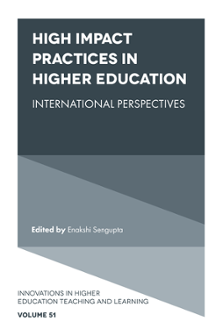
Subject Index
High Impact Practices in Higher Education: International Perspectives
ISBN: 978-1-80071-197-6, eISBN: 978-1-80071-196-9
ISSN: 2055-3641
Publication date: 27 September 2023
Citation
(2023), "Subject Index", Sengupta, E. (Ed.) High Impact Practices in Higher Education: International Perspectives (Innovations in Higher Education Teaching and Learning, Vol. 51), Emerald Publishing Limited, Leeds, pp. 245-254. https://doi.org/10.1108/S2055-364120230000051017
Publisher
:Emerald Publishing Limited
Copyright © 2023 Enakshi Sengupta
INDEX
- Prelims
- Part I: Creating Global Citizens
- Chapter 1: Introduction to High Impact Practices in Higher Education: International Perspectives
- Chapter 2: Virtual Reality and Virtual Exchange, Connecting UK and Lebanese Students to Investigate Public Health Issues in Syrian Refugee Camps
- Chapter 3: A High Impact Program Design Framework to Support Future Focused Curriculum Design
- Chapter 4: High Impact Practices in the Civil Engineering Major at the United States Air Force Academy
- Chapter 5: The Significance of Information Literacy and Transparency in Academic Class Discussions
- Chapter 6: Combining High Impact Education Practices and Active Learning Pedagogy to Address Visual Plagiarism in Applied Arts Higher Education
- Chapter 7: The Coevolution of Knowledge, Knowledge Management, and Social Competence in Higher Education
- Part II: Toward a Holistic Curriculum
- Chapter 8: Why Science Qualifications Should be a Prerequisite for Psychology Degree Programs – A Case Study Analysis From a UK University
- Chapter 9: Inclusive and Flexible Curriculum Design Framework in Work-based Learning: Providing High Impact Transnational Education Opportunities in Sub-Saharan Africa
- Chapter 10: An Analysis of First-year College English Composition Course Syllabi Using Civic Learning/Community Engagement as Learning Tools
- Chapter 11: High Impact Practices in Graduate Education: Examples from a Program Evaluation Curriculum
- Chapter 12: Internationalization Strategies in Higher Education in Mexico: Practices and Experiences at Universidad De Monterrey Business School
- About the Authors
- Name Index
- Subject Index